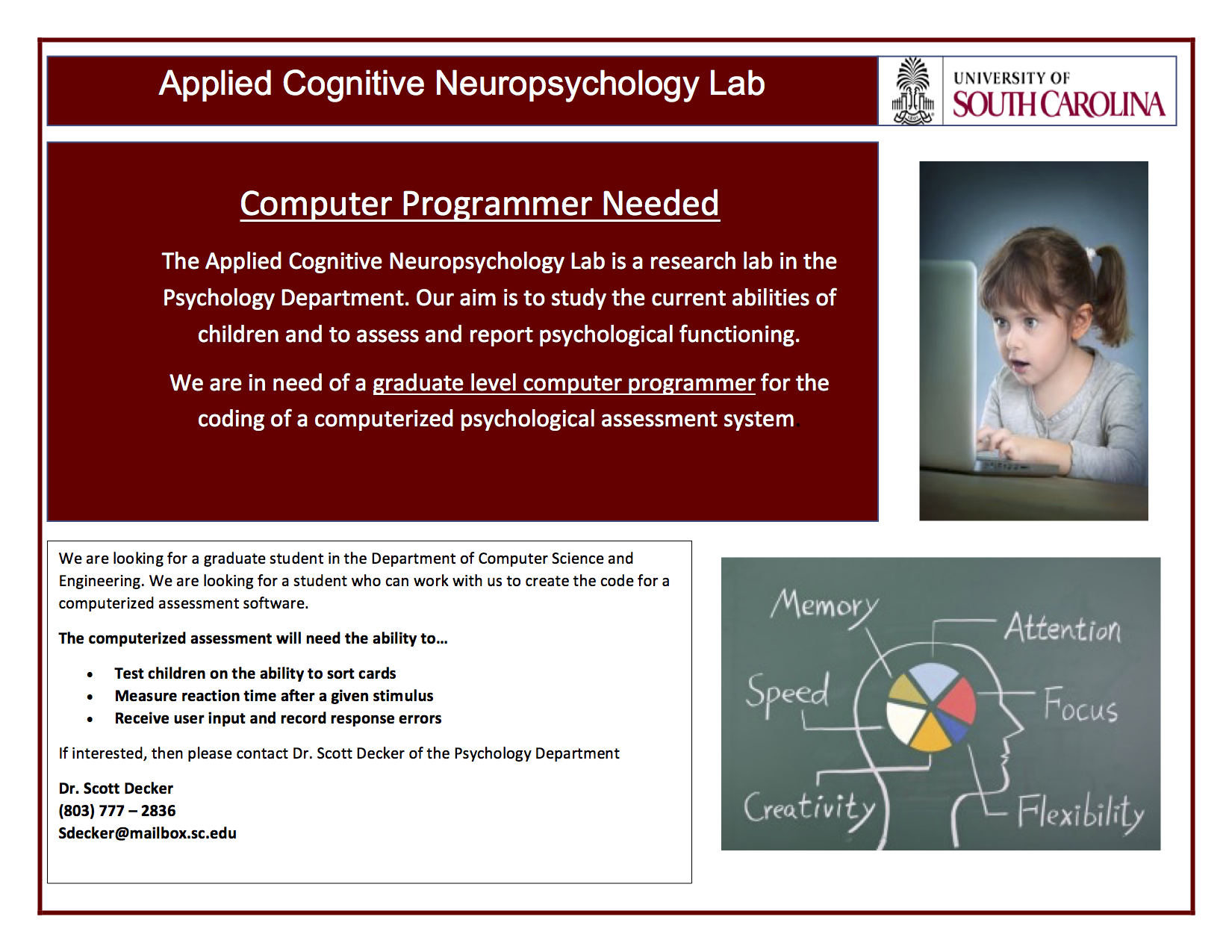Jobs Board
How I Landed a Job at Google - by Maribeth Bottorff
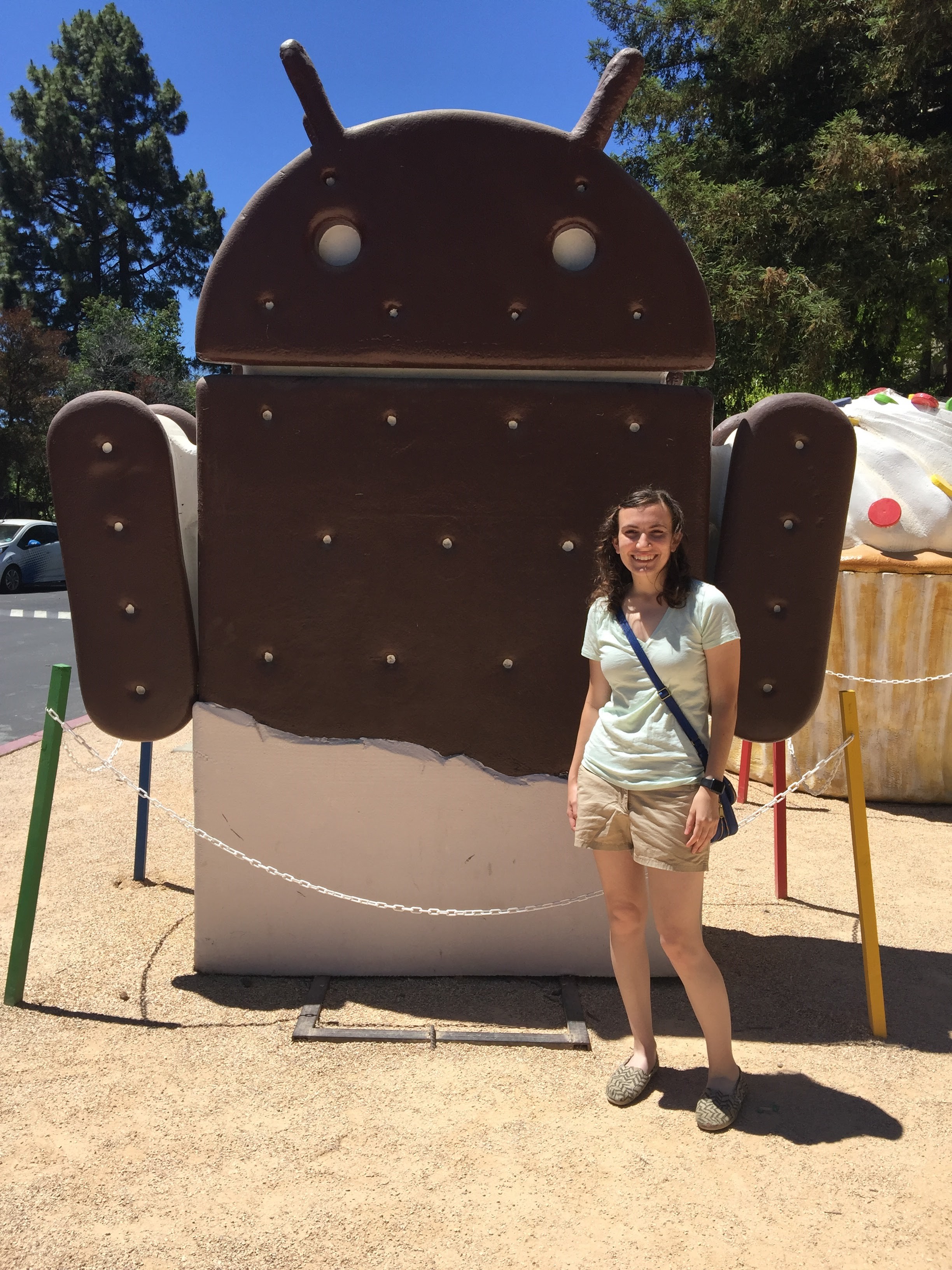 Maribeth Bottorff is one of our three class-of-2016 undergraduate majors who went to work for Google. We are extremelly proud of her. At our request, she has written the short article below about her undergraduate experiences and her advice for getting a job at Google or other major tech companies.
My name is Maribeth Bottorff and I graduated in May 2016 with a Bachelor of Science in Computer Science from UofSC. In July, I started my full-time job as a software engineer with Google through their Engineering Residency, a rotational program for new graduates. When I tell people I work at Google, I get the same reactions: “Wow, you must be so smart!” or “Wow, how did you get that job?” or “Wow, that’s awesome!” Yes, it is awesome and, yes, I’m really excited about it. But, no, I am not a prodigy, though I have worked hard to get here. And now I’m going to tell you how I got the job.
But I want to stress that this is not a formula, it’s just a glorified list of things I did and somehow at the end of it all they wanted to hire me. You could do all of these things and not get interviewed. You could do none of them and get hired and make way more money than me. Just remember that these are not instructions for you to follow, just some ideas that you could perhaps take inspiration from.
Maribeth Bottorff is one of our three class-of-2016 undergraduate majors who went to work for Google. We are extremelly proud of her. At our request, she has written the short article below about her undergraduate experiences and her advice for getting a job at Google or other major tech companies.
My name is Maribeth Bottorff and I graduated in May 2016 with a Bachelor of Science in Computer Science from UofSC. In July, I started my full-time job as a software engineer with Google through their Engineering Residency, a rotational program for new graduates. When I tell people I work at Google, I get the same reactions: “Wow, you must be so smart!” or “Wow, how did you get that job?” or “Wow, that’s awesome!” Yes, it is awesome and, yes, I’m really excited about it. But, no, I am not a prodigy, though I have worked hard to get here. And now I’m going to tell you how I got the job.
But I want to stress that this is not a formula, it’s just a glorified list of things I did and somehow at the end of it all they wanted to hire me. You could do all of these things and not get interviewed. You could do none of them and get hired and make way more money than me. Just remember that these are not instructions for you to follow, just some ideas that you could perhaps take inspiration from.
Coursework
Your coursework is the most important part of getting a degree, and I’ve been asked several times in interviews about my classes. It’s also helpful that I have projects on my resume that I did for class. I worked hard to keep my GPA up, but I also took classes that challenged me and were interesting. I could probably have found a way to have my same GPA but with less work, but instead I opted to have stories to tell from the classes I took. For example, I took the Critical Interactives: Ward One class with Dr. Buell, which was challenging technically as well as personally, and I invested a pretty large chunk of my time into the class. But I’ve also spoken about this class and the Ward One project during interviews more than any other single experience I’ve had in college. During behavioral interviews I told stories about teamwork, designing for clients, finding bugs, coping with failure, compromising for deadlines, and so many more situations all from this single class. I also took CSCE 750, the graduate level Analysis of Algorithms class, which was very tough but made me a better computer scientist as well as enabled me to better answer technical interview questions. I could have chosen an easier elective, but I would have gained fewer transferable skills from that kind of experience. The GPA as a number on my resume takes up very little space compared to the skills, projects, and experiences that I am able to list.Projects
Another important component of my resume is my projects section. Throughout college, I spent some time working on personal projects that reinforced what I was learning in class. Recruiters I’ve spoken to are interested in real-world applications of the knowledge I’ve gained in the classroom, not simply that I’ve heard someone lecturing about a topic. Depending on your specific circumstances, you may not have a lot of time to devote to projects outside of class, but I recommend making it a goal to work on something, even if it isn't very big. In fact, none of the projects that I've done outside of class have been monumental, but employers have nonetheless been very interested in them. Some example projects I've done: a Java program that reads in a text file and generates JavaScript to make an online interactive quiz, a Python program that scrapes a web page for the school weather closing status and texts me (using a free Twilio account) when we get a snow day, or a comment board that can post and update comments using Facebook’s React framework. None of those projects are huge and they will never be used by anyone other than me, but I talked about them during interviews and some of them have been on a resume at various points in time. It’s worth spending a little time, even just a weekend or a couple of hours one afternoon, creating something for yourself instead of for class.Hackathons
Another way you can generate projects for your resume is by going to hackathons. A hackathon is a typically 24 or 36 hour event where teams create an app from scratch over a weekend. Some might be themed, like hackathons to “hack” healthcare, but typically teams can build whatever they want. You can win prizes, but they’re also a good way to learn a new technology and add a project to your portfolio. They aren’t for everyone, and it’s okay if you never do them or you don’t like them. I went to PennApps in January 2016, which is one of the biggest hackathons in the country. It was pretty fun, but I’m not sure I would do it again. If you're an adrenaline junkie or you just like to stay up all night coding anyways, you might have a good time. There are also hackathons specifically aimed at beginners and people who have never been to them before, which might be a better place to start than something like PennApps which was pretty competitive. If you want to go to one, look on places like DevPost for hackathons, which typically occur in the spring and sometimes fall semesters. Many of the larger hackathons have travel reimbursements that you can apply to. For example, I went to PennApps in Philadelphia for about $15 because they reimbursed me for nearly the entire cost of the plane ticket, I didn’t need hotel accommodations because I was staying up all night hacking (or sleeping in their designated sleeping quarters), and they provided all the food and snacks (and caffeine). So even if you're on a tight budget, you may be able to participate by applying for travel reimbursement, and while you're at it, you can travel around the country or even the world (one of my friends / fellow UofSC student went to a hackathon in Switzerland) for free or a low cost to you. I now have a hackathon project on my resume and I get to talk about using AngularJS, Ionic, NodeJS, and MongoDB in interviews, which are all skills that aren’t taught in any class that I’ve taken in school but which are immediately applicable to many software engineering roles.Events and Conferences
Hackathons aren't the only events that offer travel grants, either. I’ve attended more than half a dozen conferences and events, many of which were partially or completely funded by someone else. If you’re presenting at a conference, your research mentor, the department, or student government may be able to help fund you. If you're a woman and interested in attending the Grace Hopper conference, first you should talk to your advisor or other professor who knows you so that you can be nominated for our department to send you, but you can also look at other scholarships to go, such as those offered by Google, Microsoft, Facebook, Salesforce, etc. One of the coolest conferences I got to attend was the Apple Worldwide Developer Conference in June 2015. Normally tickets are $1600 and awarded in a lottery system since it’s so popular, but I was given a free ticket to the conference through the WWDC Scholar program. I built an iOS app about myself in Swift (using the skills I learned in the Critical Interactives class I took) and was selected for a scholarship based on my app. I was in the same room where Tim Cook announced Swift would be open sourced, and I watched people clap way more for that than they did when Drake came out on stage! It was a great time and I got to go without paying for a ticket (which I never would have done on my own).Internships
The most important thing on my resume, though, when it comes to applying for full-time jobs, is my software engineering internship. Having an internship relevant to what you want to do after you graduate is so important because employers want some evidence that you know how to show up to work every day and can contribute in a corporate setting as well as the classroom. I attended the SET Fair put on by the Career Center on campus and got an internship at Premier, Inc. At the time of my interview, I had not yet finished CSCE 240 and I knew very little about software engineering, but it turned out to be an amazing summer, and I left with two mentors, several close friends, an excellent letter of recommendation, and a job offer for when I graduated. I also learned a ton of skills, like working with source control, databases, web apps, JavaScript frameworks, all of which are things not normally addressed inside the classroom. I don't think I would have gotten my job if I hadn't interned. I didn't intern as a freshman (because I was a chemistry major at the time!) but I do want to add that it is possible to get an internship as a freshman! Don't count yourself out because of how inexperienced or young you are. The advice I give to literally everyone is “let them tell you no.” Meaning, if you're not sure whether a company will take freshman interns, apply anyways and let them tell you they don't, rather than counting yourself out and not even applying. You can/should apply for regular software engineering internships, but it’s also worth checking into the freshman-specific programs that some companies have. Some examples are the Microsoft Explore program, Facebook University, and Google’s Engineering Practicum, and I believe there are others. Definitely attend the SET Fair when it comes around, and practice speaking to employers and talking about yourself and your accomplishments. You can also meet recruiters at places like hackathons and conferences that you get travel money to attend!Grace Hopper Celebration
In fact, one of the best places to meet recruiters is at the Grace Hopper Celebration career fair. I mentioned GHC before, and I highly recommend that all women try to attend. The Grace Hopper Celebration is the largest gathering of women in technology in the country; last year around 12,000 people (mostly women) attended, including representatives from over 200 companies that are trying to hire interns and full-time employees. Get a professor to nominate you for our department’s funding to go, and also check out scholarships from companies like I mentioned earlier. If you get to go, work on your resume and upload it to the resume database as soon as it opens! This is so important. I got over 30 emails and phone calls from companies either inviting me to set up interviews or to apply with priority on their online applications. I had 4 interviews at Grace Hopper last year, which led to 3 on-site interviews and 2 job offers, in addition to the other offers I had from other sources. I also turned down multiple interviews because I didn’t have enough time at the conference or because I already had better job offers on the table.Owning Your Accomplishments
The last thing I want to mention is that you should be able to talk about yourself and your accomplishments. If you've done all these great things like having an internship, completing personal projects, and going to hackathons, but nobody knows what you did, it’s hard to catch the eye of a recruiter. Don’t neglect your technical writing skills - you may need to impress both a hiring manager who can program and a recruiter who is technically illiterate with the same document. You need to have a solid resume that quantifies what you’ve accomplished and a LinkedIn profile that is up to date and tells a meaningful story about your experiences. It also helps to have allies/mentors/advocates who know you and can tell other people about your strengths. For example, Google has a form that professors can fill out to recommend their high achieving students, and the fact that at least one of my professors filled this out for me helped me move on to on-site interviews for my job. I also completed Graduation with Leadership Distinction, which you should also be able to complete if you’ve done the sort of activities I've mentioned here, where I was required to write a portfolio about my undergraduate experiences within and beyond the classroom. Completing the GLD portfolio helped me think critically about the things I've done in the past 4 years and how my extracurricular activities related to my classroom learning. Though I completed the portfolio after I already had a job, putting it together was a great way to reflect on my college career as I was about to graduate and improved my communication skills, which I'll need in my future career. I could probably write an entire article about each one of these topics, but I think I hit the highlights. Like I said at the beginning, this isn't a formula to follow but simply one person’s advice and priorities out of the many, many things you could choose to do with your college career, such as undergraduate research, volunteering and working with youth in STEM, being a teaching assistant or peer tutor, contributing to open source projects, or doing freelance/contract work. If you have any questions, feel free to get in touch via Twitter (@mebottorff), email (mebottorff@gmail.com), or connect with me on LinkedIn. Good luck with your job search!Resources
Boeing IT Summer Interns Panel Sep. 13 6pm
The Boeing Company will be hosting a panel discussion featuring former summer IT interns. The purpose is to let interested students ask questions regarding the Boeing information technology internship experience.
The panel discussion will be held in the Faculty Lounge of the Swearingen Engineering Center on Tuesday, September 13, from 6:00 to 7:00 PM. All interesting students are welcome to attend. You do not need to preregister. Bring your Carolina Card to enter the building.
Graphical user interface (GUI) development at USC: Looking for Undergrad
Advisor: Darun Barazanchy
Introduction
After algorithms are developed they remain often in a folder on a hard drive and only those involved in the development know of it. To prevent this the goal is to translate the developed algorithm into a user friendly program by developing a graphical user interface for the algorithm such that can be published on the group’s website for all to access.
Project
This project requires the student to develop a GUI for existing algorithms and improve existing GUI’s. If the student is interested the student may help in the development of algorithm (not required). Besides the GUI the student is expected to write a corresponding manual to concisely explain the working of the GUI.
Rami Harik
HARIK@mailbox.sc.edu
PHP Programmer (PHP/MYSQL) at USC
USC is developing an accreditation platform and data streaming application. We are seeking a core programmer with experience in PHP and MySQL to work closely with the faculty in charge of the platform. The programmer is expected to actively code and debug pseudocode developed by potential users. The tool will be hosted locally and security measures needs to be implemented.
Responsibilities:
- Code in PHP
- Setup MYSQL Databases
- Create safety mechanisms for database backup
- Work closely with faculty in charge of task
- Perform change management
- Create a CSS sheet for the tool interface
- Experienced programmer in PHP user management (login, security, logout…)
- Strong working knowledge of PHP and MySQL
- Experience using GIT for management of website source code
Jr. BI Engineer at LendingTree in Charlotte
**To apply, please click here: http://grnh.se/7gvj5y
Do you want to be involved in both BI Engineering and online marketing initiatives? This role will actively contribute to a critical CRM database.
Key Responsibilities:
- Deliver high quality, innovative database solutions in a fast-paced environment
- Develop ETL solutions for multiple source systems
- Develop, and support BI/CRM related database applications spanning multiple lines of business
- Collaborate effectively with developers, business analysts, and project managers to implement project deliverables
- Effectively work with business users to determine project requirements and issues
- Create and maintain technical documents
- BS. in Computer Science, Mathematics or equivalent (with a focus on data warehousing or big data solutions)
- 1+ year of experience in database development and ETL development
- Excellent verbal and written communication skills
- Proficient in Microsoft SQL Server 2008/2012 development, including: T-SQL, SSIS, SSRS, SSAS, Performance and tuning
- Experience with big data tools, such as: Hadoop, Spark, Storm
- Chance to work with top Technologist that previously were at other leading technology companies like Google, Microsoft and LinkedIn.
- Technology isn’t the only area that rocks, everyone at LendingTree does!
- Unique entrepreneurial environment. We’re a start-up company in publicly traded suit. Read: we have a lot of fun and can afford the grown-up toys.
- We’re making a real difference in the financial lives of consumers across the United States. The work you’ll do here will matter.
- We are a meritocracy, not bureaucracy
- Flat structure, very minimal oversight
- Dress code – we don’t have one. (Flip flops, shorts, jeans… whatever.)
- We don't even keep track of how many paid vacation days you take! (of course your manager's approval is needed before you take off on your family vacation.)
- Great perks: $3 catered lunches Mon. - Thurs., free bagels every Fri., on site gym (employees are encouraged to workout during the day. “Is that true?" Yep.)
- Great benefits and good work life balance
Google igniteCS Looking for Student Teachers
Hello from Google!
We are writing to let you know about igniteCS, a Google program that might be of interest to you and your school!
igniteCS provides funding and resources for groups of college and university students to make a difference in their local communities through Computer Science mentorship. You design a mentorship program that best serves your community, and Google provides resources, support and funding of up to $10,000 to help make it happen.
Applications will be accepted August 22nd through September 18th. Check out our website for further details and eligibility requirements, and take a look a look at our video! We are here to help, so please reach out if you have any questions! We hope you will apply and look forward to reading your application!
Best wishes,
The igniteCS Team
Dr. Vidal is posting this and willing to serve as your faculty advisor.
The Charleston Defense Contractors Association (CDCA) 6th Annual Mobile App Competition
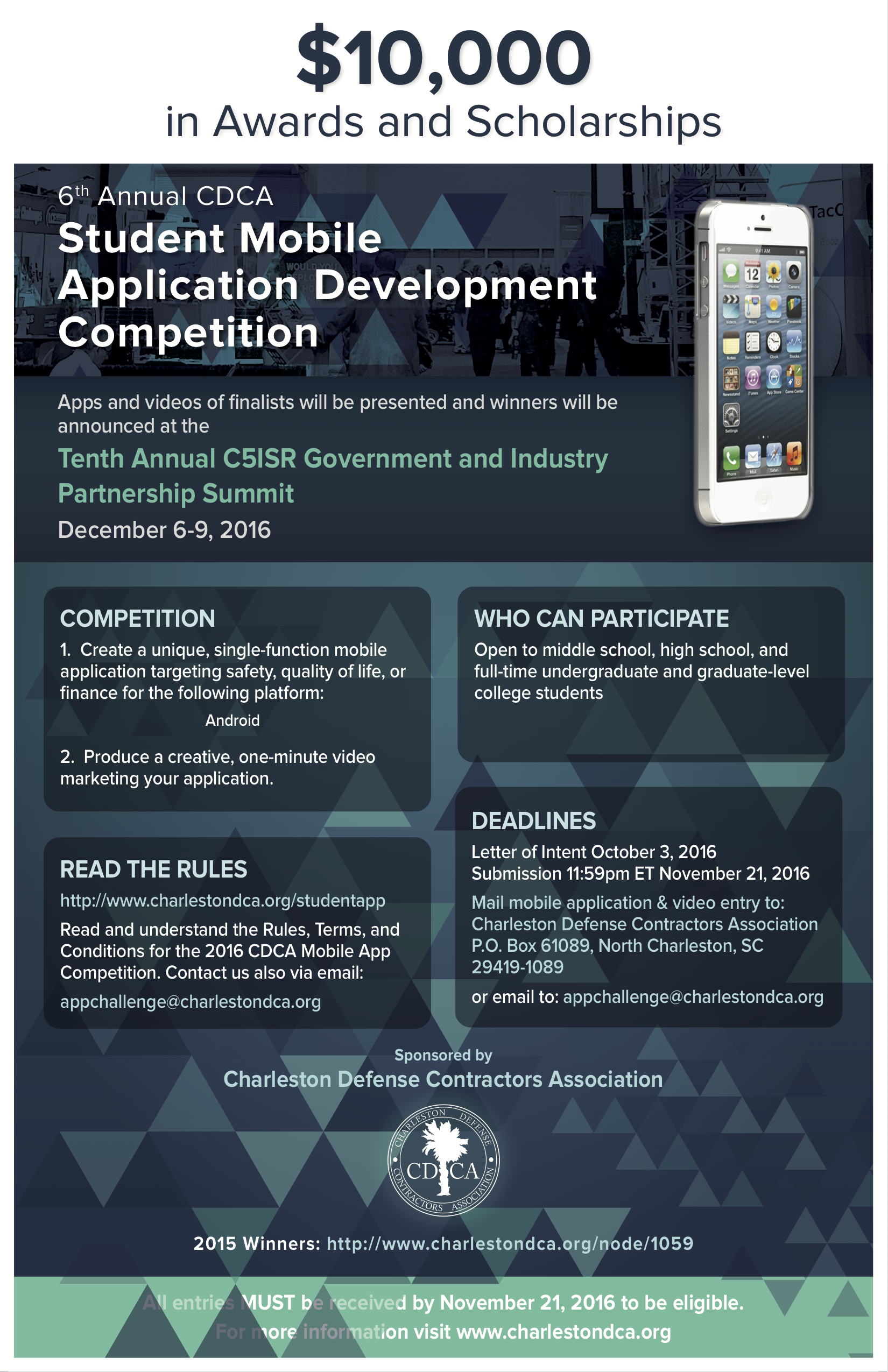 $10,000.00 in Awards and Scholarships
The Charleston Defense Contractors Association (CDCA) is pleased to announce the 6th Annual Mobile Application Development Competition in conjunction with its annual Government and Industry Partnership Summit in Charleston, SC December 6 to 9, 2016. The focus of the Mobile App Competition is to stimulate creative thinking and promote the entrepreneurial spirit while offering development support, marketing expertise, mentorship, and guidance for the participating students. The CDCA Mobile App Competition is open for participation to all Middle School, High School and full-time, undergraduate and graduate college students.
The CDCA Mobile App Competition will accept creative ideas for unique applications that is able to run on Android platform AND a one-minute video detailing the functions of the application and how it can be utilized by the general public. The competition will focus on three different target areas:
1. Safety
2. Quality of Life
3. Financial
Please find below the information on CDCA Mobile App Competition Terms and Conditions and the submission process. To be considered for award, the Application and Video must be received by 11:59 pm Eastern Standard Time (EST) on 21 November 2016.
$10,000.00 in Awards and Scholarships
The Charleston Defense Contractors Association (CDCA) is pleased to announce the 6th Annual Mobile Application Development Competition in conjunction with its annual Government and Industry Partnership Summit in Charleston, SC December 6 to 9, 2016. The focus of the Mobile App Competition is to stimulate creative thinking and promote the entrepreneurial spirit while offering development support, marketing expertise, mentorship, and guidance for the participating students. The CDCA Mobile App Competition is open for participation to all Middle School, High School and full-time, undergraduate and graduate college students.
The CDCA Mobile App Competition will accept creative ideas for unique applications that is able to run on Android platform AND a one-minute video detailing the functions of the application and how it can be utilized by the general public. The competition will focus on three different target areas:
1. Safety
2. Quality of Life
3. Financial
Please find below the information on CDCA Mobile App Competition Terms and Conditions and the submission process. To be considered for award, the Application and Video must be received by 11:59 pm Eastern Standard Time (EST) on 21 November 2016.
IT Systems Specialist, SQL Manager Positions at State Goverment
Two positions open: IT Systems Specialist, SQL Report Writer.
Send resumes directly to Charles Young at young@scscolicitor9.org
Software Engineering Interns at Krumware
Krumware LLC (www.krum.io) is looking for software engineering interns who are looking to increase their skill sets and gain active exposure to real world projects in a small-team environment. We build full-stack web applications, microservices, and enterprise integration systems, and leverage our lessons-learned to fuel growth and future development. Krum team members are often required to think outside of the box and leave their technical comfort zones in order to solve customer problems and provide robust solutions. Our office is currently based out of SOCO, in the Vista. The positions available are part-time, beginning with the Fall 2016 semester.
Ideal applicants are challenge driven, learn-by-doing, respond well to change (agile), are thought-leaders, and prefer to work as part of team.
Applicants may have exposure to some of the following, but will certainly gain exposure to them over time:
- Continuous Integration / Delivery / Deployment
- System integration, APIs
- Enterprise integration patterns
- UX/UI
- Microservices
- Containers (docker)
- PaaS (AWS/Azure/Google/Heroku/DO/etc)
- Javascript / NodeJS
- HTML, CSS, Polymer, Angular
- .NET, C#
- SQL, NoSQL
Center for Digital Humanities Hiring Developers
The Center for Digital Humanities ( http://sc.edu/digitalhumanities ) is looking for self-motivated and energetic undergraduate collaborators who are interested in being part of development teams working on major academic digital projects such as the Carlyle Letters Online (tundra.csd.sc.edu/clo). See our website for more examples of CDH projects.
Job info:
- Pay is $12/hr
- Must be able to work 10 hrs/wk
- Must be willing to work hours between 9-5
- Must be willing to work at on-campus office location
- Successful completion of CSCE 145, 146, and 240
- Proficient in at least one programming language, preferably Python
- 3-4 semesters remaining before graduation
- Python, Django
- XML, XSLT
- SQL
- Javascript, HTML, CSS
- Docker containers
Software and Hardware Developer Positions in Knoxville
I am searching for potential candidates to work for Analysis and Measurement Services Corporation. AMS is a nuclear engineering consulting firm based in Knoxville, TN with a focus on I&C safety systems testing. I am looking primarily for Electrical Engineers, Hardware Developers, Software Developers, and Software Testers. Here is our careers website with all of our current job openings:
www.ams-careers.com
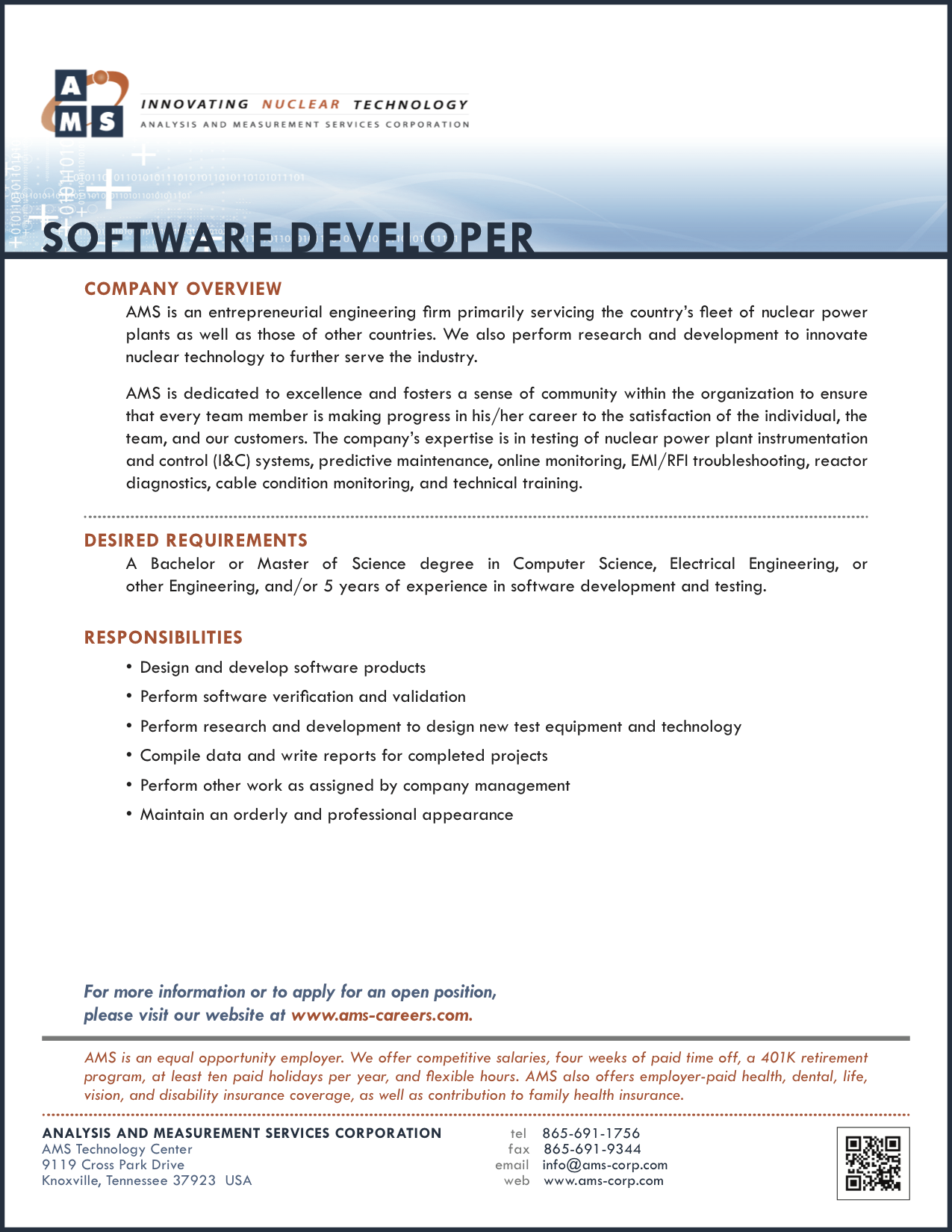
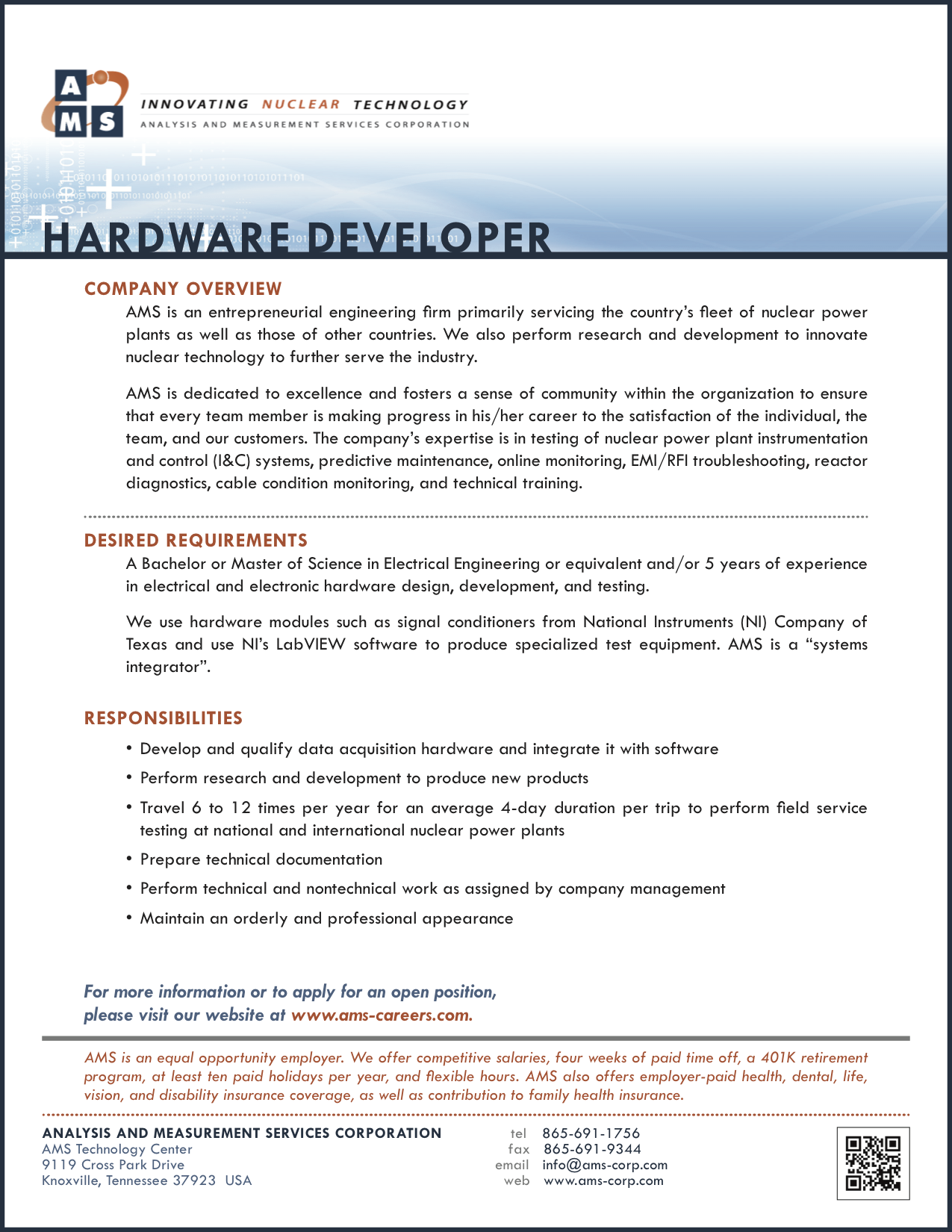


Database Programmer Needed
Looking for motivated and creative database programmers. The programmer will need to have excellent understanding of Excel and other database platforms as well as knowledge in HL7 interface. Currently, the position is either salaried or part time depending on the creativity and assertiveness of the programmer. Initially, a working database will be need to be constructed with realistic timeline of 1-2 months. After a limited time and an assessment of the applicants skill level, more work is available either project dependent or full time employment. Salary and hourly rates will be discussed during the interview process.
Patrick Springhart scharexchange@gmail.com
Customer Facing Portal Contractor
- Have experience building, from the ground up, a secure public web site ( E.g. Health Insurance Exchange, Insurance portal, etc.)
- Have experience in architecture, design, and implementation of a private cloud solution
- Our preference would be an open source stack, but we are willing to listen
- Have a knowledge of best practices for maintaining and supporting the cloud infrastructure
- Be very focused on security and scalability
- Java shop using Windows but would consider Linux.
- Could also be additional development work outside of this scope.
Computer Majors: Highest Employment Rate and Starting Salary
From Class of 2015 Is Finding Work:
Among majors, employment rates varied considerably. Computer science graduates had the highest standard, full-time employment rates (72 percent), followed by business (66 percent) and engineering graduates (62 percent). Biology majors had the lowest rates (28 percent), just under philosophy (33 percent) and physical sciences majors (34 percent). Those disparities also show up in starting salaries. At $69,214, computer science graduates were making the most money. Theology graduates, at $30,584, were making the least.It also notes that CS majors are starting their own companies, rather than getting a job with a big company, more often that in 2014.
